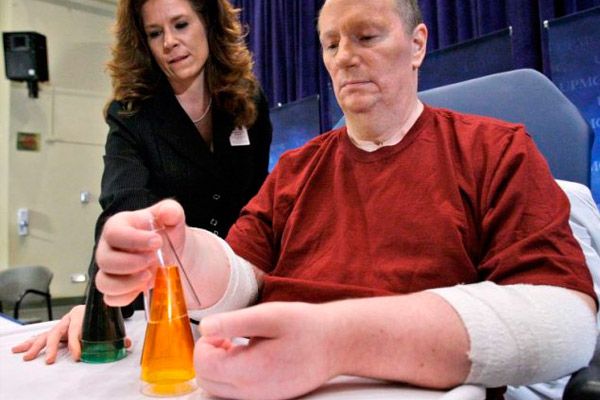New publications
One of the first participants in the hand transplant experiment regrets his decision
Last reviewed: 02.07.2025

All iLive content is medically reviewed or fact checked to ensure as much factual accuracy as possible.
We have strict sourcing guidelines and only link to reputable media sites, academic research institutions and, whenever possible, medically peer reviewed studies. Note that the numbers in parentheses ([1], [2], etc.) are clickable links to these studies.
If you feel that any of our content is inaccurate, out-of-date, or otherwise questionable, please select it and press Ctrl + Enter.
The world's first limb transplant operation was performed in the USA 7 years ago - Jeff Kepner was given 2 donor arms for the first time. At that time, this operation became a real sensation and everyone predicted a new life for the participants of the experiment. But, unlike other patients, the appearance of two arms did not bring relief to Jeff himself, rather the opposite, his life became harder and, as Kepner himself stated, he would get rid of his arms at the first opportunity.
Kepner claims that it is completely impossible to do anything with the donor hands, and since the operation, they have not regained motor activity. Incidentally, Jeff is one of the few patients who agreed to participate in the experimental operation, but in Jeff's case, all the doctors could do was graft the alien hands onto him, but not restore their mobility.
Today, transplantology has achieved outstanding success in the United States, and such complex operations as transplantation of the male genital organ, face, uterus, etc. are performed, but given the complexity of the operation, there is always a risk of complications.
Kepner's arms were amputated due to a streptococcal infection that caused sepsis, but he received prosthetics that allowed him to even drive a car and do some work; now with his new arms, he is completely dependent on others.
Jeff says that when he agreed to the transplant, he was aware of all the risks, but assumed that if it failed, the doctors would simply return his prostheses, but in reality, everything turned out differently.
The operation, which lasted 9 hours, was successful, and Kepner's body did not reject the alien limbs, but the new hands did not function. Jeff asked surgeons to remove the defective limbs, but according to doctors, this is associated with some risks, first of all, there is a high probability that Kepner will not be able to use the prostheses, and a long rehabilitation period will also be required.
Now doctors offer Kepner the only suitable option - surgery and subsequent treatment, which will allow partial or complete restoration of mobility to the donor hands. But Jeff himself is already tired of treatment and does not want any more repeat operations.

The surgeon who operated on Kepner 7 years ago noted that the organs that have taken root are removed in extremely rare cases; according to statistics, only in 6 cases out of 100 is it necessary to remove the transplanted organ. Dr. Andrew Lee also noted that there are 3 more patients in the US who took part in the experiment, but only Kepner's limbs do not function. Other patients lead a normal life, can drive a car on their own, and do certain jobs.
The outcome of such complex surgeries as limb transplantation depends on a number of factors, in particular, the patient's body plays a major role. But Kepner claims that after the operation, the surgeons were not interested in his condition, and his life after the operation became almost unbearable, since with prostheses he was more independent than with new hands from a donor. But Jeff does not blame the surgeons, the likelihood that he would have partially functioning hands after the operation was high, but in his case, mobility was not restored in the transplanted limbs, and now Kepner refuses to participate in any experiments.
Jeff Kepner's case is actually the only one that is unsuccessful; in most cases, limb motor activity is restored some time after transplantation.

 [
[